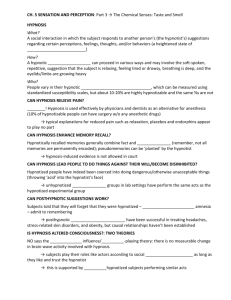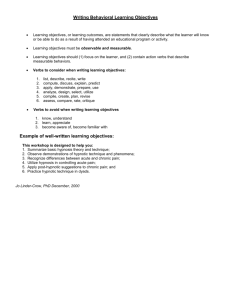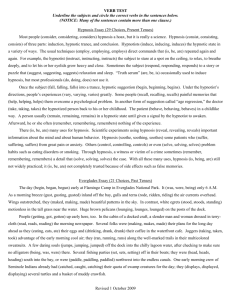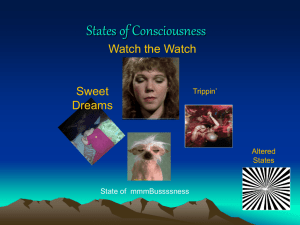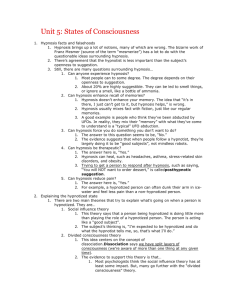Extra Credit Quiz #25
advertisement
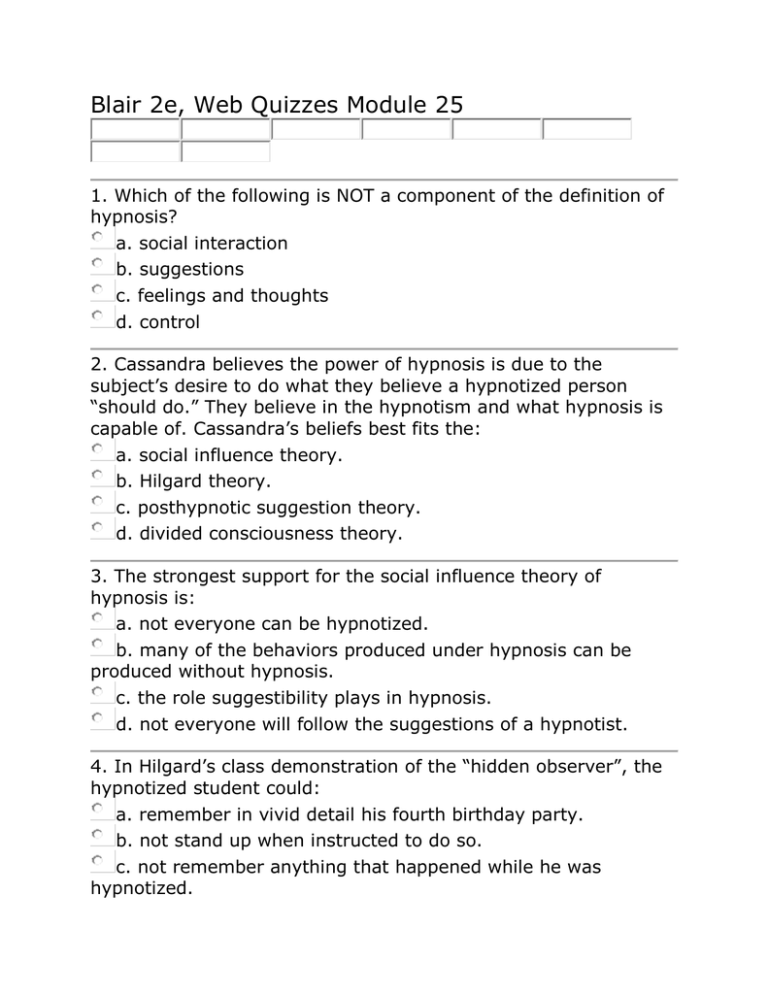
Blair 2e, Web Quizzes Module 25 1. Which of the following is NOT a component of the definition of hypnosis? a. social interaction b. suggestions c. feelings and thoughts d. control 2. Cassandra believes the power of hypnosis is due to the subject’s desire to do what they believe a hypnotized person “should do.” They believe in the hypnotism and what hypnosis is capable of. Cassandra’s beliefs best fits the: a. social influence theory. b. Hilgard theory. c. posthypnotic suggestion theory. d. divided consciousness theory. 3. The strongest support for the social influence theory of hypnosis is: a. not everyone can be hypnotized. b. many of the behaviors produced under hypnosis can be produced without hypnosis. c. the role suggestibility plays in hypnosis. d. not everyone will follow the suggestions of a hypnotist. 4. In Hilgard’s class demonstration of the “hidden observer”, the hypnotized student could: a. remember in vivid detail his fourth birthday party. b. not stand up when instructed to do so. c. not remember anything that happened while he was hypnotized. d. still hear even though it was suggested to him that he was deaf. 5. Why has the Federal Communications Commission set up rules preventing anyone from broadcasting the hypnotic induction on TV? a. People at home watching could easily become hypnotized. b. The hypnotic induction method is copyrighted. c. People at home could learn how to hypnotize someone without the proper training. d. Some people may have an adverse reaction to the hypnotic induction method. 6. According to the Stanford Hypnotic Suggestibility Scale, what percent of the population are very poor subjects for hypnosis? a. 2% b. 5% c. 7% d. 10% 7. Which of the following statements is false with regards to hypnotic suggestions? a. A hypnotized subject will follow any suggestion given to him or her. b. A hypnotized subject can hallucinate smells or tastes. c. A hypnotized subject will put their hand into what they were told is acid. d. A hypnotized subject can be made to feel angry. 8. Derek was hypnotized during a homecoming assembly. Near the end of the show, the hypnotist suggested that each time the hypnotist would state his name in his closing comments, Derek would stand up and scream, “You’re a fake!” Everyone on stage, including Derek, was brought out of the hypnotic trance and took their seats in the audience. The hypnotist thanked the audience for their attention and stated his name. Derek stood up and with a loud voice screamed, “You’re a fake!” Derek behavior was the result of: a. hypnotic suggestibility. b. hypnotic induction. c. posthypnotic amnesia. d. a posthypnotic suggestion. 9. Using hypnosis to help someone quit smoking or lose weight, a hypnotist is most likely to use: a. the social influence theory. b. a posthypnotic suggestion. c. age regression. d. divided consciousness. 10. At the end of a hypnotic therapy session, Dr. Wilbur tells Sybil she will remember only what is safe to remember. Dr. Wilbur is using what hypnotic technique to ensure that Sybil doesn’t remember any painful memories? a. hypnotic suggestibility b. hypnotic induction c. posthypnotic amnesia d. a posthypnotic suggestion 11. Which of the following is true with regards to hypnosis and memory? a. there have been some cases where a person’s memory is recovered using hypnosis b. in some cases the hypnotized person may construct inaccurate memories c. many courts ban the use of testimony from witness who have been hypnotized d. all of the above 12. A number of studies have found that people who receive treatment of any kind tend to show improvement due to their expectations. This is referred to as: a. suggestibility effect. b. open effect. c. treatment effect. d. placebo effect. 13. At the beginning of a show, a hypnotist puts himself under hypnosis and gives himself a suggestion to make his body very rigid and stiff. He then has two volunteers place his body between two chairs where his head is resting on one chair and his feet are resting on another with nothing in between. One of the volunteers then stands on the hypnotist’s stomach showing the power of hypnosis. One problem with this conclusion is: a. a subject in self-hypnosis could not accomplish such a feat. b. it is impossible to control one’s muscle tension using hypnosis. c. the feat is possible without using hypnosis. d. none of the above 14. One questionable technique in hypnosis involves the subject going back to an earlier time in their life. This phenomenon is called: a. age regression. b. posthypnotic suggestion. c. backmasking. d. hypnotic aging. 15. Which of the following is true with regards to the uses of hypnosis? a. People can perform feats of strength while under hypnosis that cannot be done without hypnosis. b. People can accurately remember past events while under hypnosis. c. Hypnosis is effective in controlling pain. d. People can remember “past lives” while under hypnosis.
